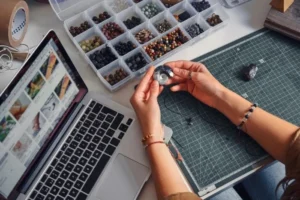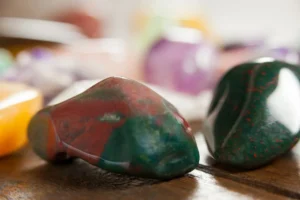“Is that old necklace in your drawer worth something?”
That’s the question I found myself asking one rainy Sunday afternoon while decluttering my flat. The necklace, a hand-me-down from an old relative, hadn’t seen daylight in years. Neither had the pair of gold earrings from an ex-boyfriend or the silver charm bracelet I’d outgrown in both age and style. I’m not one for hoarding, and if you’re reading this, chances are you’re in the same boat: looking to turn unused jewellery into something more useful—cash, space, or peace of mind.
This guide is based on personal experience, advice from professional jewellers, and hours of research. Whether you’ve got vintage brooches or broken chains, here’s how to sell unwanted jewellery the smart way.
Why Sell Unwanted Jewellery?
Selling jewellery isn’t just about the money—although that’s a big part of it. It’s about:
- Clearing clutter and simplifying your life
- Funding something new, whether that’s a holiday or home repair
- Honouring the past by letting go of items you no longer connect with
- Upcycling value rather than letting it collect dust
According to a 2023 survey by Statista, over 30% of people in the UK have jewellery they no longer wear, but only a small fraction ever consider selling it. That’s missed opportunity.
Where to Sell Unwanted Jewellery in the UK (and Online)
There’s no single best place—your ideal selling method depends on what you’re selling and what you want from the sale. Here’s a breakdown:
1. Local Jewellers and Pawnbrokers
Best for: Quick sales and getting face-to-face appraisals.
I started with my local high street jeweller. They offered a fair price for a gold ring and explained the breakdown—gold purity, current market rates, and resale potential. It wasn’t the highest offer, but it was instant cash.
Pros:
- Fast transactions
- You can negotiate
- Ideal for precious metals
Cons:
- Prices may be lower than online options
- Limited to what the shop can resell
2. Online Jewellery Marketplaces (eBay, Etsy)
Best for: Vintage, designer, or unique pieces.
Selling my antique brooch on eBay took two weeks, but it fetched nearly twice what the jeweller had offered. Photos and a strong description made all the difference.
Tips:
- Take high-quality photos
- Be honest about condition
- Include detailed descriptions: weight, hallmarks, materials
Pros:
- Global reach
- Potentially higher payouts
Cons:
- Time-consuming
- Risk of scams or returns
3. Specialist Online Gold Buyers (e.g., Hatton Garden Metals, CashforGold)
Best for: Scrap gold and silver.
Companies like Hatton Garden Metals send a prepaid envelope, evaluate your items, and offer you a quote. I tried this with a broken chain and got paid within 48 hours.
Pros:
- Convenient
- Transparent pricing
Cons:
- Impersonal
- You must send valuables by post
4. Auction Houses
Best for: High-value or rare pieces.
If you own luxury jewellery (think Cartier, Tiffany, or vintage diamonds), an auction house like Bonhams or Sotheby’s could be your best route. I consulted with Bonhams on a friend’s behalf and was impressed by the valuation and service.
Pros:
- Access to serious buyers
- Professional appraisals
Cons:
- Takes time
- Selling fees apply
5. Consignment Stores
Best for: Mid-range fashion jewellery.
Your jewellery stays in the shop until it sells, and you get a cut—usually 40–60%. It’s a slower process but good for niche or seasonal pieces.
Pros:
- Higher returns than pawnshops
- Staff handle the sale
Cons:
- Long wait
- Unsold items may be returned
How to Get the Best Price for Your Jewellery
1. Get a Professional Valuation
Before selling anything, I recommend getting at least one professional appraisal. Reputable jewellers, gemologists, or online services can do this. Be wary of free online calculators—they can be wildly inaccurate.
2. Understand the Metal and Gem Value
Gold and silver prices fluctuate daily. Check the London Bullion Market Association (LBMA) for current rates. For gemstones, the Four Cs—cut, clarity, carat, and colour—will guide pricing.
3. Clean Your Jewellery First
Presentation matters. A clean piece photographs better and feels more valuable. I used a soft brush and warm soapy water to restore an old bracelet before listing it online.
Avoiding Scams and Common Pitfalls
I learned this the hard way: never agree to sell without a written offer or contract. Here’s what else to watch for:
- Avoid pressure sales tactics
- Check reviews of any buyer or website
- Never accept payment via cheque from unknown sources
- Use insured postage when mailing valuables
Frequently Asked Questions (FAQs)
Q: Is it better to sell jewellery locally or online?
A: It depends. Local sales are quicker and safer, but online often offers better prices for unique or designer pieces.
Q: What’s the safest way to post jewellery?
A: Use Royal Mail Special Delivery with full insurance. Always get proof of postage.
Q: Should I melt down my jewellery for scrap value?
A: Only if it’s damaged beyond repair or lacks resale value. Sentimental or antique pieces are often worth more intact.
Q: Do I need to pay tax on jewellery sales?
A: In most cases, casual sellers in the UK don’t pay tax on personal item sales. But always check with HMRC if in doubt.
Final Thoughts: It’s Not Just About the Money
Selling unwanted jewellery can be surprisingly emotional. You’re letting go of history, sometimes heartbreak, sometimes just clutter. But in doing so, you’re making space—for new memories, a cleaner home, or a fuller wallet.
Whether you use a jeweller, an auction house, or an online platform, do it thoughtfully. Don’t rush. Take the time to understand your item’s worth, both financially and personally.
And if you’ve recently sold a piece—how did it go? I’d love to hear your story or tips in the comments.
Ready to sell? Start by picking one piece today and researching its value. You might be surprised by what that old necklace is really worth.




